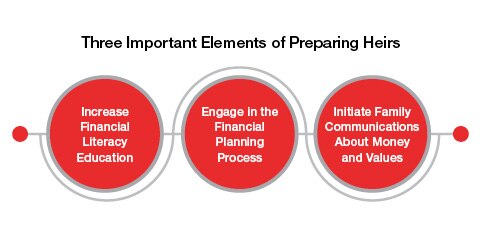Considerations for the Great Wealth Transfer – Part Two

The Key Wealth Institute is a team of highly experienced professionals representing various disciplines within wealth management who are dedicated to delivering timely insights and practical advice. From strategies designed to better manage your wealth, to guidance to help you better understand the world impacting your wealth, Key Wealth Institute provides proactive insights needed to navigate your financial journey.

The three important elements of preparing heirs are:
- Increase financial literacy education
- Engage in the financial planning process
- Initiate family communications about money and values
Be Curious and Initiate a Conversation
Family communication around money and values helps ensure the financial wealth you leave behind contributes to a positive, lasting impact on your family. In his book “Defining Conversations,” author Mitch Anthony suggests “it is in the exchange of conversation that we connect or disconnect with people, promote or impede progress, affirm or deny credibility, and seal our legacy and reputation.”2
What gets in the way of parents and grandparents having impactful conversations about money? Many are reluctant due to concerns about propriety or privacy. For others, they wait for the right time or just the right thing to say and over the years neither seem to come along. To address concerns over propriety or privacy, instead of talking about dollar amounts and strategies, Anthony often suggests discussing your earliest memory of money, and how that impacts you today. You can ask this question anytime. And instead of appearing to start the conversation from out of the blue, consider prompting the conversation by reading this article and expressing your desire to share.
Consider starting your conversation with an “I” statement that focuses on your own feelings and experiences rather than what your child or grandchild should do or has done or failed to do. If you can express your experience in a way that does not attack, criticize, or blame others, you are less likely to provoke defensiveness and hostility, which tends to escalate into conflict, or have the other person shut down or tune you out. For example, over dinner or coffee, you could start a conversation with, “I was thinking about my earliest memory of money. Would you like to hear about it? It was …”
Many people share about a paper route or a babysitting job and how it provided for extras that their parent(s) could not afford. Others share an early memory of themselves or their parent(s) helping someone less fortunate or being the one who was helped. Some share their awareness of money when they experienced a sudden change in circumstances from poor or middle class to affluent or the reverse scenario.
Next, be curious and ask your child or grandchild whether they would be willing to share their earliest memory about money. Listen to understand, not to respond. A great follow-up question is to ask your child or grandchild, “How does that memory or experience impact you today?” Again, listen to understand, not to respond or advise. Try asking, “What else?” or “Can you tell me more about that?” to keep the conversation going. Thank your child or grandchild for sharing their experience and make time to reflect on what you heard and learned before evaluating what might be the next best topic for conversation.
An example of a different perspective is a family that experienced a significant increase in financial wealth between generations. The book, “Strangers in Paradise: How Families Adapt to Wealth Across Generations,” by James Grubman, Ph.D., provides insights into the challenges to understanding each other between a wealth creator and their children who grow up benefiting from wealth in ways the wealth creator did not experience when they were growing up. Grubman shares the metaphor of being either an immigrant or native to the land of wealth.
Be Intentional and Keep the Door Open
Be intentional about keeping the door open so you can have more money and values conversations. Be careful something does not cause the door to slam shut. Keep in mind, each one of us has our own perspective for how we view wealth and the role of money in our lives. Seek to understand your child’s or grandchild’s point of view to help increase clarity as you make decisions for yourself and others.
Many people are comfortable keeping the conversational door open by exploring topics that help define wealth in terms other than dollars. For ideas, review a few of the resources on key.com:
- Brief exploration of other forms of wealth — human, intellectual, social, relational, and spiritual. https://www.key.com/kpb/your-life/preserve-and-protect-your-legacy.html
- Questions to consider about your family, your wealth, and your values: https://www.key.com/kpb/your-life/all-about-family.html
Values Conversation
Many families find identifying and discussing personal values to be a meaningful way to keep the conversational door propped open. Start by listing your top three or five values and then create a value statement and provide an example of how you see this value being acted on in your life. If you need help finding the best word for what you value, review the list at the end of this article. Identify your top 10 values and then from the list of 10, refine it down to your top five and finally refine it to your top three core values.
I value integrity and try to model it by trying to do the right thing in every situation, no matter if anyone is watching or cares. An example of this that sticks with me is when I started my business and a customer overpaid me. I refunded them the money even though times were tight. They appreciated my honesty because times were tight for them too. I also have two other core values … .
Next time you are having coffee or dinner with your child or grandchild, you can share your values “I” statement as a conversation starter. For example, “I recently went through an exercise to refine my personal values and create a value statement. Can I share it with you?” By the time you share your top three core values, your child or grandchild may have some questions and they may be interested in going through a similar exercise themselves.
If you identify a shared or complementary core value, then your next conversation may be about ways you can act on this value together. For example, your child may value fun and share, “I value fun and try to bring it into my life by inviting others to play games. An example of how fun is incorporated into my life is hosting a board game night with a group of friends once every few months.” You may have a core value of family and could ask your child if they would like to combine fun and family by participating in a board game night at the next family gathering.
Conclusion
Value-based conversation suggestions are for small conversational steps that will help build a stronger communication foundation. Combined with your efforts to increase financial literacy and to help your children engage in the financial planning process, you will create the underpinnings that should help support more challenging conversations and prepare your heirs for the wealth they will inherit.
Values to Consider as You Refine Your List of Your Top Three Core Values
- Acceptance
- Achievement
- Adventure
- Authenticity
- Autonomy
- Balance
- Beauty
- Bravery
- Challenge
- Choice
- Collaboration
- Community
- Compassion
- Competition
- Contribution
- Creativity
- Equality
- Excellence
- Expertise
- Faith
- Fame
- Family
- Financial Rewards
- Freedom
- Friendship
- Fun
- Happiness
- Harmony
- Health
- Helping Others
- Honesty
- Humor
- Intellect
- Influence
- Kindness
- Leadership
- Learning
- Love
- Loyalty
- Making a Difference
- Nature
- Peace
- Personal Growth
- Power
- Reaching Potential
- Recognition
- Respect
- Responsibility
- Romance
- Routine
- Security
- Service
- Solitude
- Spirituality
- Status
- Success
- Teaching
- Teamwork
- Tolerance
- Tradition
- Travel
- Trust
- Winning
- Wisdom
For more information, please contact your advisor.

About Renee Porter-Medley
Renee is a highly experienced professional who works closely with the relationship team to understand a client’s personal situation and goals and develop an integrated, customized set of strategies to help them reach their objectives. She earned a Bachelor of Arts in International Studies with a major in Finance from the University of Michigan, and a Master of Professional Studies in Organization Development from Penn State University. Renee an active member of Kingdom Advisors, the Planned Giving Council, and the Purposeful Planning Institute. Her professional development for the past 10 years has been focused on helping families flourish by leveraging financial capital to develop their human, social, intellectual, and spiritual capital.